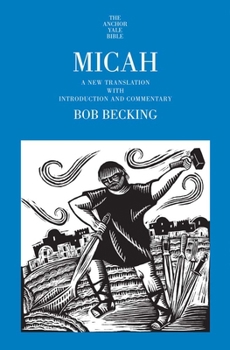Micah: A New Translation with Introduction and Commentary
A new translation and commentary on the biblical book of Micah that proposes a convincing new theory of its composition history While the biblical book of Micah is most famous for its images of peace--swords turned to plowshares, spears turned to pruning hooks--and its passages of prophetic hope, the book is largely composed of prophecies of ruin. The historical Micah, who scholars believe lived in the late eighth century BCE, is the first recorded prophet to predict the fateful fall of Jerusalem, and he also foretells the destruction of the regions of Samaria and Judah, in addition to the more well-known promises of Judah's eventual restoration. In this volume, Bob Becking provides a new translation of the Hebrew text and illuminates the book's most important elements, paying special attention to its literary features, political context, and composition history. Drawing on ancient Near Eastern comparative evidence, archaeological notes, and inscriptions, Becking surveys debates surrounding the book's interpretation and concludes that Micah uttered a variety of prophecies over the course of many years which a later redactor collected and molded into a proto-apocalyptic, alternating prophetic futurology.
Format:Hardcover
Language:English
ISBN:0300159951
ISBN13:9780300159950
Release Date:June 2023
Publisher:Yale University Press
Length:304 Pages
Weight:1.35 lbs.
Dimensions:1.2" x 6.1" x 9.3"
Customer Reviews
0 rating





